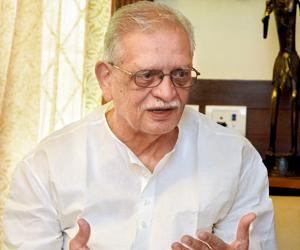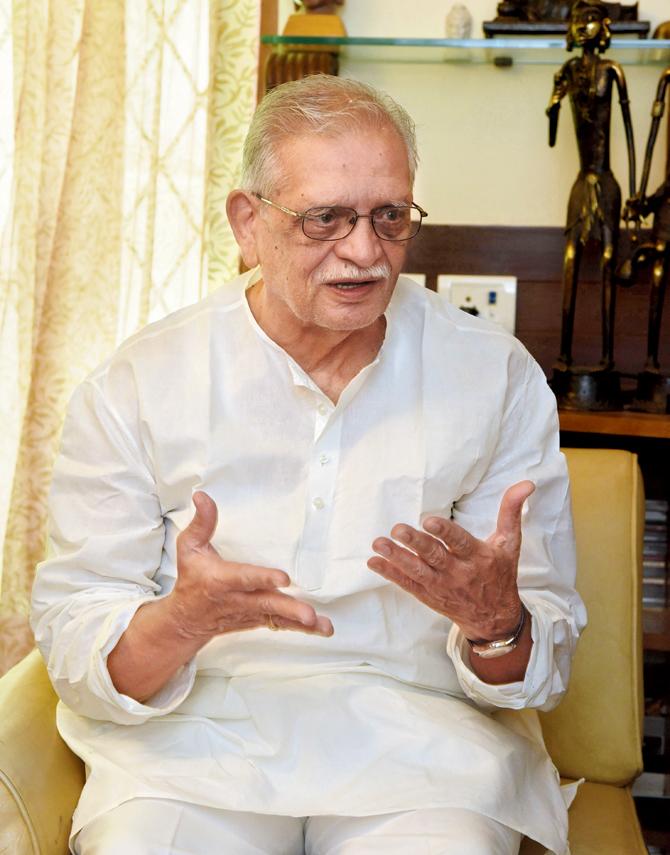Veteran writer and lyricist Gulzar's debut novel, Two, which takes us back to the real story behind the making of India and Pakistan, explains why some wounds will never heal

This is our second visit to Gulzar's Pali Hill bungalow, and the one thing that appears to remain unchanged, apart from his trademark starched white kurta-pyjama, is the veteran lyricist's hospitality. Even before we settle in his study - the only area that has been spared of the ongoing renovation work - he calls in for refreshments. When we politely refuse, he insists, not once, but a couple of times, till we give in. The last time when we showed up on a hot summer afternoon, Gulzar had thoughtfully suggested nimbu paani; today, owing to the foggy weather, we engage over coffee.

Gulzar. Pic/nimesh dave
ADVERTISEMENT
One can't deny that this warmth comes naturally to the octogenarian, but when he shares a story from many moons ago, and one that is closely related to his debut novel, Two (HarperCollins India), based on the Partition, we know the roots go deeper. "I grew up in a home where our doors were open for anybody who came from the other side [Pakistan]. It was like a refugee camp; my father, Sardar Makhan Singh Kalra, was always welcoming," recalls Gulzar of the days following the Partition. Gulzar, whose family had homes in Delhi and Dina [now in Pakistan], had to forgo the latter. "I've seen the Partition, and it affected me terribly," he recalls, "I was only 11 or 12 when I saw people being killed right in front of my eyes. I cry today when I think about it, but I didn't cry then. I was too stunned to absorb what was happening around me. But, for more than 25 years after that incident, I would have nightmares of the riots. I would refuse to go back to sleep, terrified that I'd see that same dream again. So, you can imagine how much of the Partition still remains with me," he adds.
He began writing his new novel in Urdu three years ago, and later translated it into English. It emerged from the need to "purge" his mind of those haunting memories, he admits. Gulzar's own journey as a writer began with him reading and re-reading the works of Saadat Hasan Manto and Rajinder Singh Bedi, who wrote on the disturbing aftermath of the recklessly drawn borders. "They were familiar stories for me. Their works sub-consciously taught me how to express myself," he says. It began with poetry, short stories and later, plays, all on the same subject. "For some reason, I never had the patience to write a novel," he recalls. But, the need to write Two arose from the fact that people, like him, who had experienced the Partition first hand, hadn't fully recovered. "A riot here, or there, and I was reminded of those days again," he says. He tells us now, and also explains in the book, why healing wasn't something that could ever be achieved. "Unlike, say, the effects of the Second World War, which found an outlet in the arts, in the books that have been written on it, and films that have addressed its horrors, there has been very little discussion around the Partition. It's like a family secret," shares Gulzar.
The novel, hence, becomes less a narrative, and more a graph to capture the after-effects on the lives of the people. "Did they ever settle down after being uprooted?" Gulzar asks. The need to investigate this took him back to meeting many relatives and friends, who shared this common, bloodied history. The novel opens in Campbellpur, today's Attock (in Pakistan), and offers the reader a brief glimpse of the untainted lives of the people of this small city, before they turn against each other. It drifts and moves in non-linear fashion from the Partition, to Independence, the many riots in the 20th and 21st century, and all we get is a semblance of no resolution from the pain and despair. When Gulzar began writing this novel, he thought that putting down everything he had felt and experienced, would help him let off some steam. We ask, if it did. He remains silent for a while, before answering, "That will perhaps, never be possible."
 Subscribe today by clicking the link and stay updated with the latest news!" Click here!
Subscribe today by clicking the link and stay updated with the latest news!" Click here!







